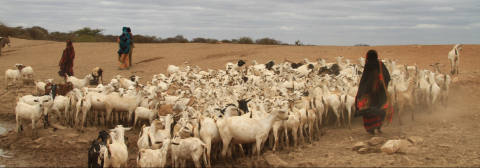
Land rights remain a complex and ambiguous subject for the majority of people in sub-Saharan Africa. In Ethiopia, formal state laws assert that women have equal rights regarding land use and access. However, Ethiopia's pastoral areas are often highly influenced by both religious and customary systems, under which women tend to have weaker land rights. A recent report by Abebaw Abebe Belay of Ethiopia's Ministry of Agriculture and Fiona Flintan of the International Livestock Research Institute (ILRI) aims to understand women's land rights under formal and customary legal systems in Ethiopia's pastoral areas. The report also seeks to determine how these systems are applied and their impact on the ground. It concludes with recommendations for their convergence. The study is part of a larger effort across India, Tanzania and Ethiopia by ILRI to understand and improve pastoralist women's land rights, financially supported by the CGIAR Research Program on Policies, Institutions and Markets (PIM).
In recent years, the government of Ethiopia has taken steps to protect the land rights of women through a variety of laws and the establishment of related institutions. Despite this commitment, customary practices and stereotypes remain prevalent in the country's pastoral regions, limiting pastoralist women's ability to exercise their land rights. Understanding the complex interactions between state and customary systems of law is critical to helping pastoralist women better access land and resources. To date, there has been a dearth of research on this topic.
To address this gap, Belay and Flintan examined both customary rules and formal laws in two pastoral regions of Ethiopia: Afar and the Borana zone of Oromia. Their study included a literature review of Ethiopian policy and legislation, followed by fieldwork to determine how formal policy and legislation interact with related customary rules, regulations and institutions.
One of the central findings from the research is that there is a significant disparity between what formal laws state and what is being practised on the ground in the two regions. In Afar, where society is gradually changing but remains more patriarchal, the presence of both customary and religious systems ensures that women continue to have inferior access to land in comparison to men, regardless of what Ethiopia's formal laws may state. While women are generally able to use communal grazing areas without limitation and discrimination, customary norms prevent them from accessing rural private holdings.
In contrast, Borana society is less patriarchal, and state laws and the customary system govern women's land rights without influence from a religious system. As a result, women have relatively equal status to men when it comes to land use and access. In fact, many women in the region have private plots and participate directly in the management of communal lands. There does, however, continue to be discrimination against women concerning land inheritances.
Overall, the research suggests that in both Afar and Borana, there is little discrimination against women as far as communal land use is concerned. Instead, limitations to women's land rights seem to arise in relation to the inheritance of land, dispute settlements and other private properties.
To address these issues, Belay and Flintan note that it is not an option to simply replace the customary system with the formal system, as formal state law has not been developed with any concern for customary norms. On the other hand, adhering solely to the customary system will likely not benefit the interests and rights of women.
Instead, legal pluralism is advantageous in the short term because it provides additional avenues for land users, including women, to access their land rights. The study's interviewees also generally support legal pluralism, likely because it would allow landholders an option of where to turn for legal assistance. For a system of legal pluralism to succeed, it must recognize the customary system while at the same time ensuring the protection of women's rights and human rights in general.
In the long term, the convergence of the customary and formal systems is an option for the Ethiopian government, but it will not be an easy task. The first step is to ensure that formal state laws take into account customary and religious norms. Equally important is legal empowerment and raising awareness for entire communities. Communication campaigns can make women aware of their formal land rights, and free legal aid service centres can provide women with the legal information necessary to invoke those rights successfully. Belay and Flintan's report is an important starting point, but in the long run, the convergence of the formal and informal systems will have to come from within the Ethiopian government.
